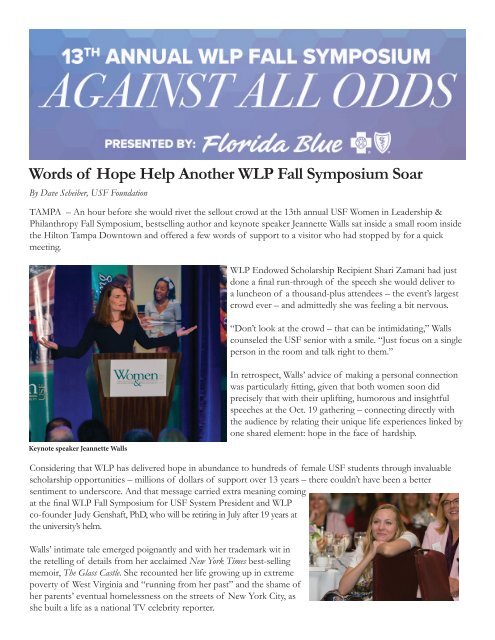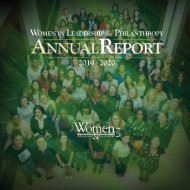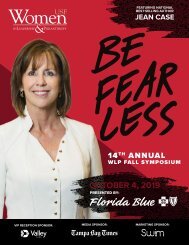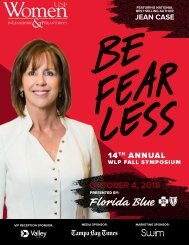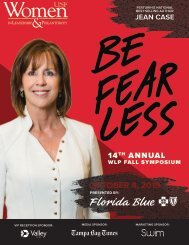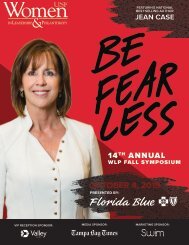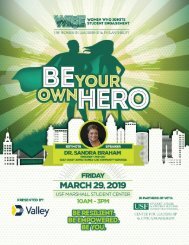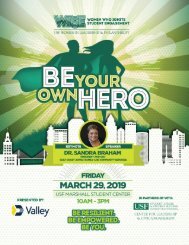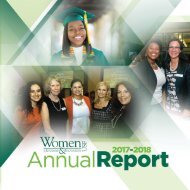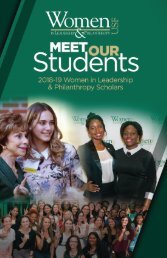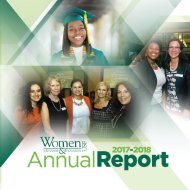Words of Hope Help Another WLP Fall Symposium Soar
By Dave Scheiber
By Dave Scheiber
You also want an ePaper? Increase the reach of your titles
YUMPU automatically turns print PDFs into web optimized ePapers that Google loves.
<strong>Words</strong> <strong>of</strong> <strong>Hope</strong> <strong>Help</strong> <strong>Another</strong> <strong>WLP</strong> <strong>Fall</strong> <strong>Symposium</strong> <strong>Soar</strong><br />
By Dave Scheiber, USF Foundation<br />
TAMPA – An hour before she would rivet the sellout crowd at the 13th annual USF Women in Leadership &<br />
Philanthropy <strong>Fall</strong> <strong>Symposium</strong>, bestselling author and keynote speaker Jeannette Walls sat inside a small room inside<br />
the Hilton Tampa Downtown and <strong>of</strong>fered a few words <strong>of</strong> support to a visitor who had stopped by for a quick<br />
meeting.<br />
Keynote speaker Jeannette Walls<br />
<strong>WLP</strong> Endowed Scholarship Recipient Shari Zamani had just<br />
done a final run-through <strong>of</strong> the speech she would deliver to<br />
a luncheon <strong>of</strong> a thousand-plus attendees – the event’s largest<br />
crowd ever – and admittedly she was feeling a bit nervous.<br />
“Don’t look at the crowd – that can be intimidating,” Walls<br />
counseled the USF senior with a smile. “Just focus on a single<br />
person in the room and talk right to them.”<br />
In retrospect, Walls’ advice <strong>of</strong> making a personal connection<br />
was particularly fitting, given that both women soon did<br />
precisely that with their uplifting, humorous and insightful<br />
speeches at the Oct. 19 gathering – connecting directly with<br />
the audience by relating their unique life experiences linked by<br />
one shared element: hope in the face <strong>of</strong> hardship.<br />
Considering that <strong>WLP</strong> has delivered hope in abundance to hundreds <strong>of</strong> female USF students through invaluable<br />
scholarship opportunities – millions <strong>of</strong> dollars <strong>of</strong> support over 13 years – there couldn’t have been a better<br />
sentiment to underscore. And that message carried extra meaning coming<br />
at the final <strong>WLP</strong> <strong>Fall</strong> <strong>Symposium</strong> for USF System President and <strong>WLP</strong><br />
co-founder Judy Genshaft, PhD, who will be retiring in July after 19 years at<br />
the university’s helm.<br />
Walls’ intimate tale emerged poignantly and with her trademark wit in<br />
the retelling <strong>of</strong> details from her acclaimed New York Times best-selling<br />
memoir, The Glass Castle. She recounted her life growing up in extreme<br />
poverty <strong>of</strong> West Virginia and “running from her past” and the shame <strong>of</strong><br />
her parents’ eventual homelessness on the streets <strong>of</strong> New York City, as<br />
she built a life as a national TV celebrity reporter.
But Walls explained how she came to face her fears and embrace the family dysfunction from which she tried so<br />
hard to hide, becoming a stronger and more self-aware person as a result. Her father’s promise that the family would<br />
one day live in a “big glass castle” never materialized, and his Christmas “present” <strong>of</strong> the planet Venus to her as a<br />
child may have been empty on one level. But she came to regard both as irreplaceable gifts.<br />
“It was a priceless treasure,” she said <strong>of</strong> her father’s planetary present in a family that had precious little money and<br />
was constantly on the run. “It is whatever we choose to make it. You can say that about so many things in life. I think<br />
you can say that about the glass castle.”<br />
“Dad never did build us a big ol’ fancy mansion,” Walls continued. “But I believe – I choose to believe, because it is a<br />
choice – that he gave us something much more valuable than a fancy mansion to live in. And that was hope … the<br />
belief that I deserved something more than what I had. And I believe that’s what this afternoon is about. It’s not<br />
just giving these young women scholarships – it’s giving them hope.”<br />
Then there was Zamani, who never lost it – in<br />
spite <strong>of</strong> dealing with considerable self-doubt, fear<br />
<strong>of</strong> failure and an unplanned disruption in her<br />
education.<br />
<strong>WLP</strong> Endowed Scholar Shari Zamani providing her inspiring testimonial.<br />
As it turned out, she needed no help overcoming<br />
her jitters to deliver a heartfelt and inspiring talk.<br />
Speaking with poise and power, the public health<br />
major wasted no time commanding the room by<br />
revealing not only that she was the first woman in<br />
her family to attend college but had never actually<br />
graduated from high school. She went on to<br />
describe how she had struggled with academics and<br />
how one day as a junior she left class to get some<br />
water. “And I just kept walking. I left school … and<br />
never went back.”<br />
She worked for three years, waiting tables, bartending and earning her cosmetology license, yet always felt that<br />
there was something else in store for her. Overcoming a fear <strong>of</strong> failure, Zamani got enough courage to apply<br />
to Hillsborough Community College. She heard that the school <strong>of</strong>fered an assessment test that would allow her<br />
admission to college, without a diploma or taking the GED. She passed and suddenly a new world opened up for her<br />
– with the realization that she enjoyed and excelled at math, and that many <strong>of</strong> her past academic problems were due to<br />
dyslexia.<br />
Zamani went on to graduate from HCC with the top GPA<br />
and as class Valedictorian, and had no doubt that she would<br />
continue her education at USF as a junior transfer. “I chose<br />
USF because <strong>of</strong> the quality and variety <strong>of</strong> its academic<br />
programs, the diversity <strong>of</strong> the student body and, in all honesty,<br />
because the president <strong>of</strong> the university was a she.” Cheers and<br />
laughter erupted as Zamani gestured to a beaming President<br />
Genshaft and continued to hold the audience’s rapt attention.<br />
Revealing she is on track to graduate in December with a 4.0<br />
GPA, Zamani expressed gratitude for all <strong>of</strong> the scholarship support she has received from USF and <strong>WLP</strong> and once<br />
again addressed the President.
“Dr. Genshaft, it is a supreme privilege to be the student speaker at your final <strong>WLP</strong> <strong>Symposium</strong> as President,”<br />
she said. “As the leader that has made USF what it is today … as a founder <strong>of</strong> <strong>WLP</strong>, an organization that has<br />
had a tremendous influence on my college career and my life … as an amazing role model and a true Woman <strong>of</strong><br />
Leadership & Philanthropy, I’d like to say thank you – for everything.”<br />
It was one <strong>of</strong> many highlights at <strong>WLP</strong>’s signature event, which raised an unprecedented $320,000 Friday.<br />
Speakers included <strong>WLP</strong> Chair Carolyn House Stewart, Esq. ’74; community leader and philanthropist Pamela<br />
Muma, talking about The Pamela Muma Women’s Health Center that will soon open its doors at Tampa General<br />
Hospital; and <strong>WLP</strong> Executive<br />
Director India Witte.<br />
There was also the presentation<br />
<strong>of</strong> <strong>WLP</strong>’s Community Leadership<br />
Award to Liz Kennedy ’80 and<br />
<strong>WLP</strong>’s Lifetime Achievement Award<br />
to Liana Fernandez Fox, PhD ’80 &<br />
’98. Each expressed their gratitude<br />
following stirring video tributes.<br />
“The lives that Liana and Liz have<br />
lived really exemplify what <strong>WLP</strong> is all<br />
about – women elevating women,”<br />
Witte said.<br />
Of course, Genshaft’s final moment<br />
at the <strong>Symposium</strong> podium as USF<br />
President was especially memorable,<br />
and was greeted by a prolonged<br />
standing ovation.<br />
Liana Fernandez Fox, PhD ’80 & ’98, Jeannette Walls and Liz Kennedy ’80 savoring the moment.<br />
“As part <strong>of</strong> <strong>WLP</strong>, we share a common<br />
goal,” she said. “That is simply to create and support opportunity to develop the next generation <strong>of</strong> women leaders<br />
… It isn’t any one grant or any one initiative. It is the community that we build – a community that represents<br />
everyone in this room, and especially to help women be all that they can be.”<br />
And, as the <strong>Symposium</strong> message also underscored, a community built on the power <strong>of</strong> hope.
A Brief Question and Answer Session With Jeannette Walls<br />
Prior to her luncheon keynote address, Walls spoke about <strong>WLP</strong> scholars and the power <strong>of</strong> education in<br />
their lives – and her own. Here is a sample <strong>of</strong> what Walls had to say:<br />
Q. What was it like talking to some <strong>of</strong> the <strong>WLP</strong> scholars about their thoughts for the future?<br />
A. “It’s so inspirational. And I think one <strong>of</strong> the things I love about this event is that it doesn’t feel like a charity.<br />
It feels like giving these young people the tools that they need to become better people and contribute to society.<br />
And in talking to these kids, I saw myself a little bit. Struggling to get an education – it’s not easy. I almost had<br />
to drop out <strong>of</strong> college because I was a thousand dollars short. And I had trouble asking people for help. I didn’t<br />
know the avenues or if there were organizations like this to assist me. But to talk to these young people and hear<br />
their stories, and hear about the obstacles they overcame, it’s inspirational for me. I was telling them, because I<br />
completely believe this: The struggles you’re going through right now will make you better down the road. The<br />
fact that you’ve had to work so hard to get where you are, you understand what it is that you want and why you<br />
want it. This will be very useful to you one day.”<br />
Q. Talk about the importance <strong>of</strong> education to you when you’re in a place <strong>of</strong> adversity.<br />
A. “When pulling people out <strong>of</strong> poverty, there’s nothing more important than education and a sense <strong>of</strong> selfesteem,<br />
and the two <strong>of</strong>ten go hand in hand. Once you get an education, you’re going to feel better about yourself.<br />
If you don’t feel good about yourself, you’re not going to get an education. They’re interwoven. But if you have<br />
the tools to better yourself, and the belief that you deserve something better than maybe what you grew up with,<br />
then you can achieve just about anything. But I think one <strong>of</strong> the troubling things about poverty and hardship<br />
is that it does not down your self-esteem. You think you’re not as good as the rich kids. And I think one <strong>of</strong> the<br />
wonderful things about <strong>WLP</strong> is that says: ‘Of course you are! And we’re going to open some doors for you. We’re<br />
not going to do the walk but we’ll open those doors so you can get in.’ And that is life changing.”<br />
Q. How did you get over your fear <strong>of</strong> stepping into the world, coming from such a challenging<br />
childhood?<br />
A. “I always felt a little bit <strong>of</strong> the imposter syndrome myself. I think that these young people I’ve talked become<br />
identified with that – do I deserve this wonderful life that I’ve somehow found my way into? I told them, ‘Not<br />
only do you deserve it, do you deserve it more because you worked so hard for it. And the important thing is I<br />
really believe that when they reach a certain point, they will turn around and help other people. And that’s one <strong>of</strong><br />
many reasons why what is being done here is so important. It’s not just these scholars that we’re helping. It’s all<br />
<strong>of</strong> the people they’re going to help. This is such a grassroots endeavor that says, ‘We are going to make this world<br />
a better place.’ And it is education that is the great equalizer.”<br />
Q. What did going to college mean to you?<br />
A. “A lot <strong>of</strong> my classmates didn’t seem to know why they were there – it was just what you did after high school<br />
– but I knew why I was there. I calculated down to the dollar what each class was costing me. One time, one <strong>of</strong><br />
my classmates asked me, ‘Do you want to skip class today?’ And I said, ‘Why would I skip class? Am I going to<br />
get a refund?!’ College is so important to those <strong>of</strong> us who have been out in the world and understand what it’s<br />
like to not be college educated. In fact, I was thinking not going to college because I had a job, but I’m so glad<br />
I did. I’d be making apologies for the rest <strong>of</strong> my life. As soon as people hear you have a college education, it<br />
changes everything.”


